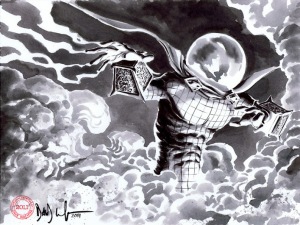I can restart the Israeli-Palestinian peace process in three words.
But first a lesson in grammar.
Passive voice. Ever heard of it?
Super-grammarian Geoffrey Pullum has. Daily Planet editor Perry White has too. But White, according to Pullum, has no idea what it is. In J. Michael Straczynski and Shane Davis’ Superman: Earth One, Mr. White explains to cub reporter Clark Kent: “Active sentence structure versus passive structure. A good reporter always goes for the former, never the latter. It’s ‘A dog was killed last night,’ not ‘Last night, a dog was killed.’”
And then Pullum swoops in through a window: “It looks as if the editor of The Daily Planet thinks that it is passive sentence structure to use any adjunct constituent set off by commas. So he would condemn sentences like Michael Corleone’s You’re out, Tom, or Today, I settle all family business, for being passive!”
In his Chronicle of Higher Education article “Passive Writing at the ‘Daily Planet,’” Pullum bemoans the sorry state of grammatical knowledge among not just fictional newspaper editors. Your “freshman-comp TA” and writing gurus Strunk and White get it wrong too. Pullum considers it a serious educational issue.
I teach first-year composition, but my concern isn’t educational. It’s moral.
Passive voice is evil.
If you accept Stan Lee’s superhero prime directive, “With great power comes great responsibility,” then passive voice is a supervillain’s weapon of choice.
Which might explain why politicians use it so often. The Fat Man and Little Boy of literary examples were both launched by the Nixon administration. When press secretary Ron Ziegler was discussing Watergate, and when Secretary of State Henry Kissinger was discussing Vietnam, both deployed the same phrase:
“Mistakes were made.”
Who made the mistakes? Impossible to say. The sentence is missing its subject, the agent, the actor of the action. And there lies the villainy. Passive voice erases responsibility. It’s how bad guys make their escape.
Look at Mysterio. He routinely eludes Spider-Man by dropping smoke bombs and ducking away in the confusion. If you rewrite the sentence
“Mysterio dropped a smoke bomb,”
as
“A smoke bomb was dropped,”
then Mysterio (subject and villain) vanishes twice. He ducks away in the syntactical confusion. Passive voice writes him right out of the sentence.
Perry’s example, “A dog was killed,” actually IS passive voice (whether it happened last night or not), because the sentence masks the identity of the dog-killer. Did Mysterio kill the dog? Did Richard Nixon? Nobody knows.
Which is why reporters like Clark Kent sometimes use passive voice. The police, like the readers of the sentence, are still searching for the killer.
But what if the information is known and the writer obscures it?
That’s where things get ugly.
Reaching past my shelf of comic books, I have The Palestine-Israeli Conflict in hand. Instead of dual-statehood, Dan Cohn-Sherbok and Dawoud El-Alami settle for dual-authorship. And that’s about all they agree on. Each pens his own history. The book is a journey down the same river twice, but in very different boats.
When describing events of 1948, Dawoud El-Alami writes: “Jewish terrorist organizations . . . carried out a massacre of men, women and children in the village of Dier Yassin.” That’s active voice. The subject of the sentence carries out the massacre. In contrast, Dan Cohn-Sherbok describes the same incident with the phrase: “the policy of self-restraint was abandoned.” That’s passive. Who abandoned self-restraint? His syntax doesn’t want to tell.
Cohn-Sherbok goes on to describe a similar incident from 1982: “More than three hundred refuges were massacred.” Passive again. And Dawoud El-Alami, to no surprise, employs active voice again: “The militia massacred between seven hundred and one thousand people (some reports say two thousand).”
Technically, the two pairs of sentences don’t contradict (even mathematically, since two thousand is “more than” three hundred). But Cohn-Sherbok employs passive voice at its immoral worse. His syntax erases responsibility.
Now I’m not suggesting that the “Palestinian Perspective” half of The Palestine-Israeli Conflict is any more accurate than the “Jewish Perspective.” Dawoud El-Alami has his own array of rhetorical maneuvers for ducking blame.
If you’re wondering about my political biases, I find myself agonizingly sympathetic to both sides. The most guilty party is England, who, desperate to fight Nazi Germany, promised the same homeland to two different aspiring nations. The results were horrifically predictable.
But if you don’t think England is responsible, then this is a job for passive voice:
“The Jews and the Palestinians were promised the same land.”
Promised by whom? By Mysterio’s trademark cloud of syntactical smoke.
At least Clark Kent isn’t fooled. He recently escaped the grammatical misinformation of Perry White to strike out on his own as a blogger. It was big news. Last November, after a discussion of the Israel-Hamas cease-fire, NPR’s Talk of the Nation host Neal Conan explained:
After more than 70 years as a mild-mannered reporter, Superman quit his day job at The Daily Planet. A fed-up Clark Kent delivered a diatribe in front of the entire newsroom on his way out the door. ‘I was taught to believe you could use words to change the course of rivers,’ he said, ‘that even the darkest secrets would fall under the harsh light of the sun.’
Are you listening, Dan and Dawoud? Your words are changing the course of rivers. Take responsibility for your subjects, even their darkest secrets.
That’s the first step in this English professor’s plan for world peace:
Ban passive voice.
[And for the super-grammarians out there, I should point out that both “The dog was killed” and “The dog was killed by Richard Nixon” are examples of passive voice, even though the second sentence apprehends the killer. Only the first, the agentless subgroup of passive voice, is evil. The second is just criminally clumsy.]





I’ve been a Geoff Pullum fan since he wrote The Great Eskimo Vocabulary Hoax (http://users.utu.fi/freder/Pullum-Eskimo-VocabHoax.pdf).
Pullum has written extensively about the widespread misunderstanding of what is meant by “passive voice” and he explains this quite well in that Lingua Franca article.
Clearly, you understand his objections and your discussion proceeds from this correct understanding of the relevant grammatical terminology. That said, I’m pretty sure GKP would take issue with the statements “passive voice is evil” and “ban passive voice”; indeed, I can’t help but notice that you actually use it yourself: “At least Clark Kent isn’t fooled.” Or did you just throw that in to see if we were paying attention? :-)
Here’s what GKP’s colleague Mark Liberman had to say about this topic: http://languagelog.ldc.upenn.edu/nll/?p=3142
I’ll stand up for passive voice. Sometimes you don’t know who did something, or are trying to get an effect. (“I was so tired I didn’t know what I was doing. Somewhere in there the dog was walked, but I’m not sure how.”) And, of course, you can use active voice to lie too. (“Drone strikes kill only terrorists.”)
Pointing out weasily political speech is worthwhile, but it seems like you should blame the weasily political speakers, not the defenseless grammatical construction.
that perry white thing is…just bizarre. I’ve never ever seen anyone use “passive” in that sense. But, according to that CHE post, it’s from Strunk and White; the pdf he links to, where he takes down S&W, is eye-opening. Indeed, my monocle popped out and fell into my martini glass. I’d only ever heard of S&W second-hand; I had no idea it was so stupid — anyone who rails against split infinitives is automatically marked as an idiot. But at least with the split infinitive, I know which “rule” is being invented; I can’t even guess what the hell these people think is “passive”, much less why it should be avoided.
Just re-reading White’s speech there — guh whuh? Luckily, here in Australia we don’t use S&W, but generally Fowler, who is not only eminently sensible but also quite funny.
In any case, this idea, that the passive voice is often used by apologists for power, to efface responsibility, goes back to Orwell. But isn’t it (pardon me) by now a banal truth, at least among people who think about grammar (a very small subset of the overall population)?
Actually, Orwell’s objections were a little different than that. Again, the Language Log folks have been obsessed with this for years and they talk about Orwell here (among many other posts on the topic): http://itre.cis.upenn.edu/~myl/languagelog/archives/003366.html. They generally take great glee in showing how Orwell, S&W and other prescriptivists frequently violate their own rules.
BTW, I love Orwell. In addition to the big two, his Keep the Aspidistra Flying is one of the funniest novels I’ve ever read; I find Homage to Catalonia (and his writing about the Spanish Civil War in general) pretty inspirational, The Road to Wigan Pier is also well worth a read, as are his many essays. But much of his advice about writing in Politics and the English Language is seriously misguided.
The issue with passive voice is really one that comes out of the mouth of editors and writing professors: passive voice is typically more verbose, and not as direct as active voice. When you are writing, whether stories or philosophy, the editor wants you to use the language that will hit with the most impact and most get your point across. Passive voice doesn’t do that and to some degree beats around the bush. Writing professors are trying to make your words the most efficient they can be, and passive voice misses on that mark as well.
I developed passive voice early on when writing papers for school because we were told to take the “I” out of our writing (that’s passive voice right there.) I think it serves a point to some degree, but it definitely makes me a much more wordy writer.
Of course there are situations where one should avoid using the passive voice, but to issue an across-the-board ban on it makes no sense at all. Would “Rome wasn’t built in a day” really be improved by rewriting it using the active voice? Is a sentence such as “A pedestriam was struck and killed during rush hour traffic” really improved if it’s rewritten as “A car struck and killed a pedestriam during rush hour traffic”?
Henry Hitchings also writes about the ethical implications of grammatical choices this morning in the New York Times:
The Dark Side of Verbs-as-Nouns
http://opinionator.blogs.nytimes.com/2013/04/05/the-dark-side-of-verbs-as-nouns/
Hitchings: “Nominalizations give priority to actions rather than to the people responsible for them. Sometimes this is apt, perhaps because we don’t know who is responsible or because responsibility isn’t relevant. But often they conceal power relationships and reduce our sense of what’s truly involved in a transaction. As such, they are an instrument of manipulation, in politics and in business.”
I wouldn’t ban verbing nouns or nouning verbs (anymore than I would seriously suggest banning passive voice), but it is helpful to draw attention to the ways language manipulates our understandings.
So the comment about agentless passives being evil was just hyperbole? *whew*
Re: Hitchings’ concerns:
Is “what should I take away from today’s lecture?” really all that different from “What’s the take-away from today’s lecture?” as Hitchings claims? To me, both seem to reduce the lecture to a sound bite. Yes, there’s a shift in emphasis, but not a huge shift in meaning. As always, YMMV.
English has a weird addiction to passives, and a passive I haven’t encountered in any other language: the double passive.
Consider:
ACTIVE VOICE
“John sent a letter to Jane.”
The agent, “John”, is the subject of the verb.
SIMPLE PASSIVE VOICE
“A letter was sent to Jane by John.”
The direct object is now the subject.
DOUBLE PASSIVE VOICE
“Jane was sent a letter by John.”
The indirect object is now the subject! This formulation drives my French students nuts!
Jones: agree totally on Fowler! Partridge is great too — see ‘Usage and Abusage’.
But Strunk and White is actually a good general guide to clear, effective prose despite its clunkers.
What a delightful article! On-target with jabs explaining how “passive voice erases responsibility,” the Mysterio examples splendidly apropos.
Even if Noah is quite right when pointing out “you should blame the weasely political speakers, not the defenseless grammatical construction,” certainly it’s most worthwhile to attempt to (I’ve no hope one can actually succeed) heighten awareness in the masses about how rhetorical tricks, sentence construction can obscure responsibility, sway, manipulate, even create passively-accepting mindsets.
On somewhat related veins:
————————-
What something gets called can have more spin on it than a Mariano Rivera cutter, whether the person doing the calling intends it that way or not. Sometimes the difference between positive and negative is a matter of taste, literally or figuratively. (My sweet might be your treacly. Or your cloying.)…
In politics, the naming is almost always with malice (or niceness) aforethought. Judea and Samaria, the West Bank, the Occupied Territories, Occupied Palestine: all denote the same geographical reality, but on a sliding (or ascending, take your pick) moral scale. Call it what you will—enhanced interrogation or torture, collateral damage or civilian deaths, pro-life or anti-reproductive rights, global warming or climate change, homosexual marriage or marriage equality, assault rifles or “semi-automatic small-calibre sporting rifles with plastic accessories”—it’s all the same, and (excepting torture and warming) it’s all, to some degree, propaganda…
————————
Much more, including how the Compromiser-In-Chief accepted the right wing’s term, “entitlements,” at http://www.newyorker.com/talk/comment/2013/04/08/130408taco_talk_hertzberg
And…
————————–
PowerPoint Is Evil
…Particularly disturbing is the adoption of the PowerPoint cognitive style in our schools. Rather than learning to write a report using sentences, children are being taught how to formulate client pitches and infomercials. Elementary school PowerPoint exercises (as seen in teacher guides and in student work posted on the Internet) typically consist of 10 to 20 words and a piece of clip art on each slide in a presentation of three to six slides -a total of perhaps 80 words (15 seconds of silent reading) for a week of work…
In a business setting, a PowerPoint slide typically shows 40 words, which is about eight seconds’ worth of silent reading material. With so little information per slide, many, many slides are needed. Audiences consequently endure a relentless sequentiality, one damn slide after another. When information is stacked in time, it is difficult to understand context and evaluate relationships…
———————–
http://www.wired.com/wired/archive/11.09/ppt2.html
And, “U.S. Army discovers PowerPoint makes you stupid”:
————————
In General McMaster’s view, PowerPoint’s worst offense is…rigid lists of bullet points (in, say, a presentation on a conflict’s causes) that take no account of interconnected political, economic and ethnic forces…
Commanders say that behind all the PowerPoint jokes are serious concerns that the program stifles discussion, critical thinking and thoughtful decision-making. Not least, it ties up junior officers — referred to as PowerPoint Rangers — in the daily preparation of slides, be it for a Joint Staff meeting in Washington.
Commanders say that the slides impart less information than a five-page paper can hold, and that they relieve the briefer of the need to polish writing to convey an analytic, persuasive point. Imagine lawyers presenting arguments before the Supreme Court in slides instead of legal briefs…
————————–
http://blogs.computerworld.com/16006/powerpoint_makes_you_stupid
Thanks to all for the links contributed, BTW…